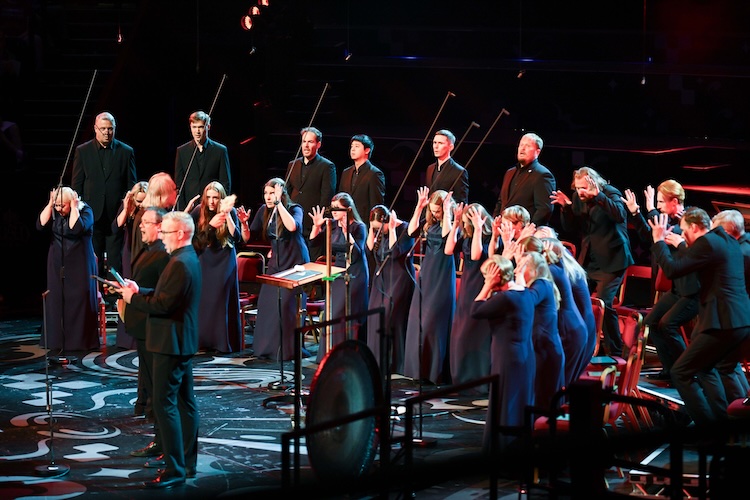Stillness and contemplation characterise this well sung late-nighter

Arvo Pärt was into his 40s before he made had his Big Musical Idea: simplicity. He has spent the subsequent half-century pursuing this ideal, largely through the religious choral music that has been dubbed Holy Minimalism. And in this year of his 90th birthday, the Proms gave the Estonian Philharmonic Chamber Choir a late-night concert to celebrate this music – and the people turned out, in what was the best-attended late-nighter I can remember.
The programme consisted of eight (plus an encore) small pieces by Pärt, alongside other pieces in similar vein, and one very much not. What was noticeable was that, for a one-idea composer (and this is not meant pejoratively: it’s a very good idea) there is quite a variability between the pieces, with each having its own harmonic world and some working better than others (to my ears, at least). Da pacem Domine had a gently pulsing stillness that was quite hypnotic, the unmagnificent Magnificat is humility personified, intimate and completely pared down, and The Deer’s Cry – my personal highlight – was very striking. It sets the words of St Patrick, an insistent “Christ with me” underpinning a gradual build-up of texture and volume. It was stunning, and beautifully sung. But I was less convinced by the upper-voice Peace upon you, Jerusalem and found the last scheduled item – Vater unser – quite threadbare. I was delighted when they followed it with an exquisite, poised lullaby, which could not have had less to it, could not have been quieter, but hit with disproportional emotional impact, perfect in its unresolved ending. Of the other pieces, Galina Grigorjeva’s Svyatki had a crystalline solo from Yena Choi and some wonderful aleatoric choral textures. The “Bogoroditse Devo” from Rachmaninov’s All-Night Vigil was very moving, and had a rare moment of full-throated fortissimo from the singers, who spent most of the evening sotto voce. And the motet Ich lasse dich nicht, only recently attributed to JS Bach, was a delight. Only the piece I had most been looking forward to disappointed. Veljo Tormis’s Curse upon iron, a driven, manic incantation, replete with conductor Tõnu Kaljuste thrashing a shaman drum in lieu of conducting, needed more wildness. The soloists felt too polite and the whole thing not quite frenzied enough, although it built nicely to a great shrieking climax. Perhaps they just didn’t have the numbers to give it the wow factor in such a big hall? Certainly the visceral excitement of the piece just didn’t make its way to where I was sitting, but regardless, the piece is still a choral masterwork, and I was glad to hear it.
Of the other pieces, Galina Grigorjeva’s Svyatki had a crystalline solo from Yena Choi and some wonderful aleatoric choral textures. The “Bogoroditse Devo” from Rachmaninov’s All-Night Vigil was very moving, and had a rare moment of full-throated fortissimo from the singers, who spent most of the evening sotto voce. And the motet Ich lasse dich nicht, only recently attributed to JS Bach, was a delight. Only the piece I had most been looking forward to disappointed. Veljo Tormis’s Curse upon iron, a driven, manic incantation, replete with conductor Tõnu Kaljuste thrashing a shaman drum in lieu of conducting, needed more wildness. The soloists felt too polite and the whole thing not quite frenzied enough, although it built nicely to a great shrieking climax. Perhaps they just didn’t have the numbers to give it the wow factor in such a big hall? Certainly the visceral excitement of the piece just didn’t make its way to where I was sitting, but regardless, the piece is still a choral masterwork, and I was glad to hear it.
The concert was thoughtfully presented with coloured uplights making a halo around the 26-strong choir, and had a lovely sense of ritual. Tõnu Kaljuste was a charismatic master-of-ceremonies, his conducting as minimal as the music, apart from when he was beating the drum, or flamboyantly touching the tubular bell.
Vt veel: BBC Proms: Estonian Philharmonic Chamber Choir, Kaljuste review – Arvo Pärt 90th birthday tribute